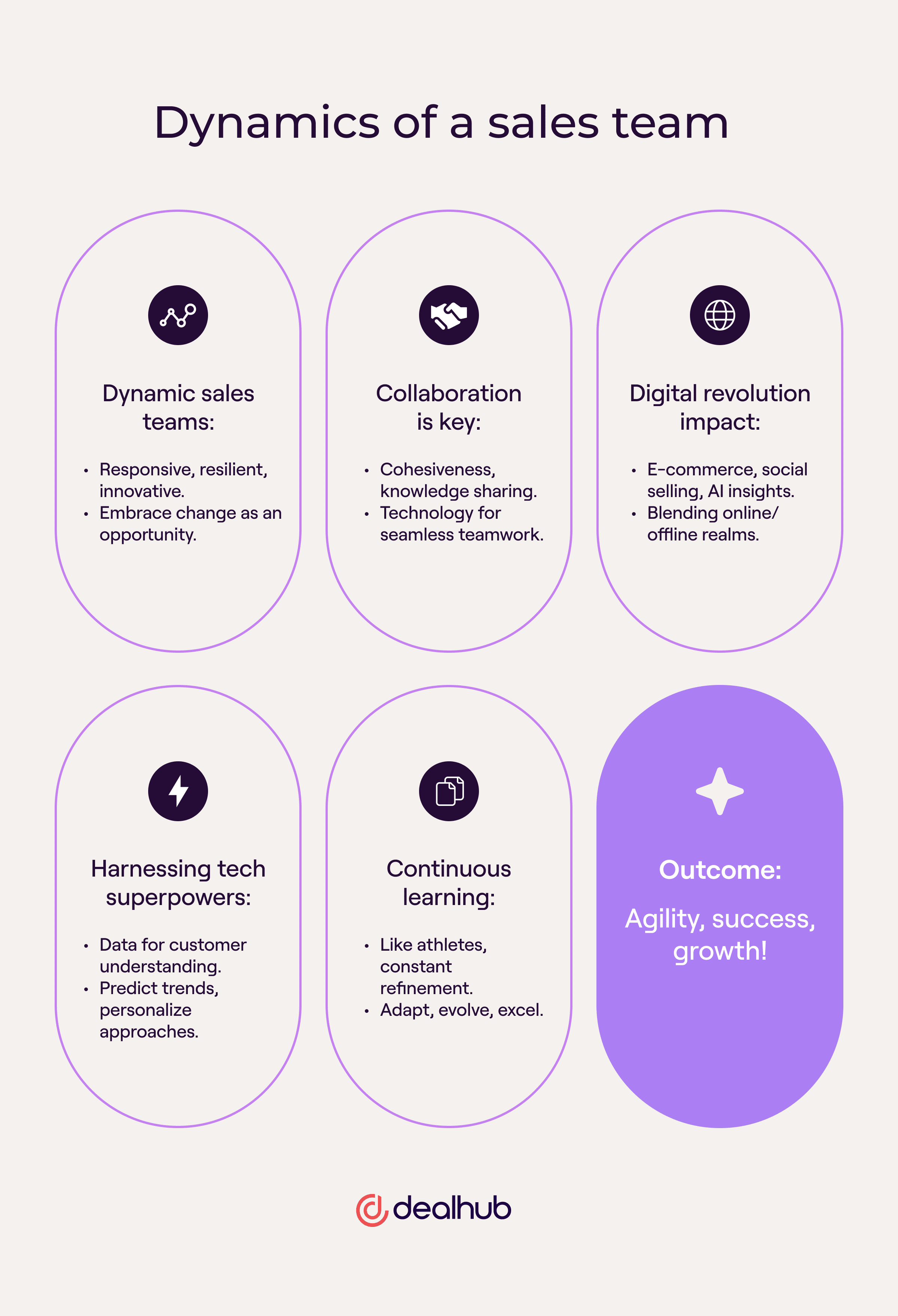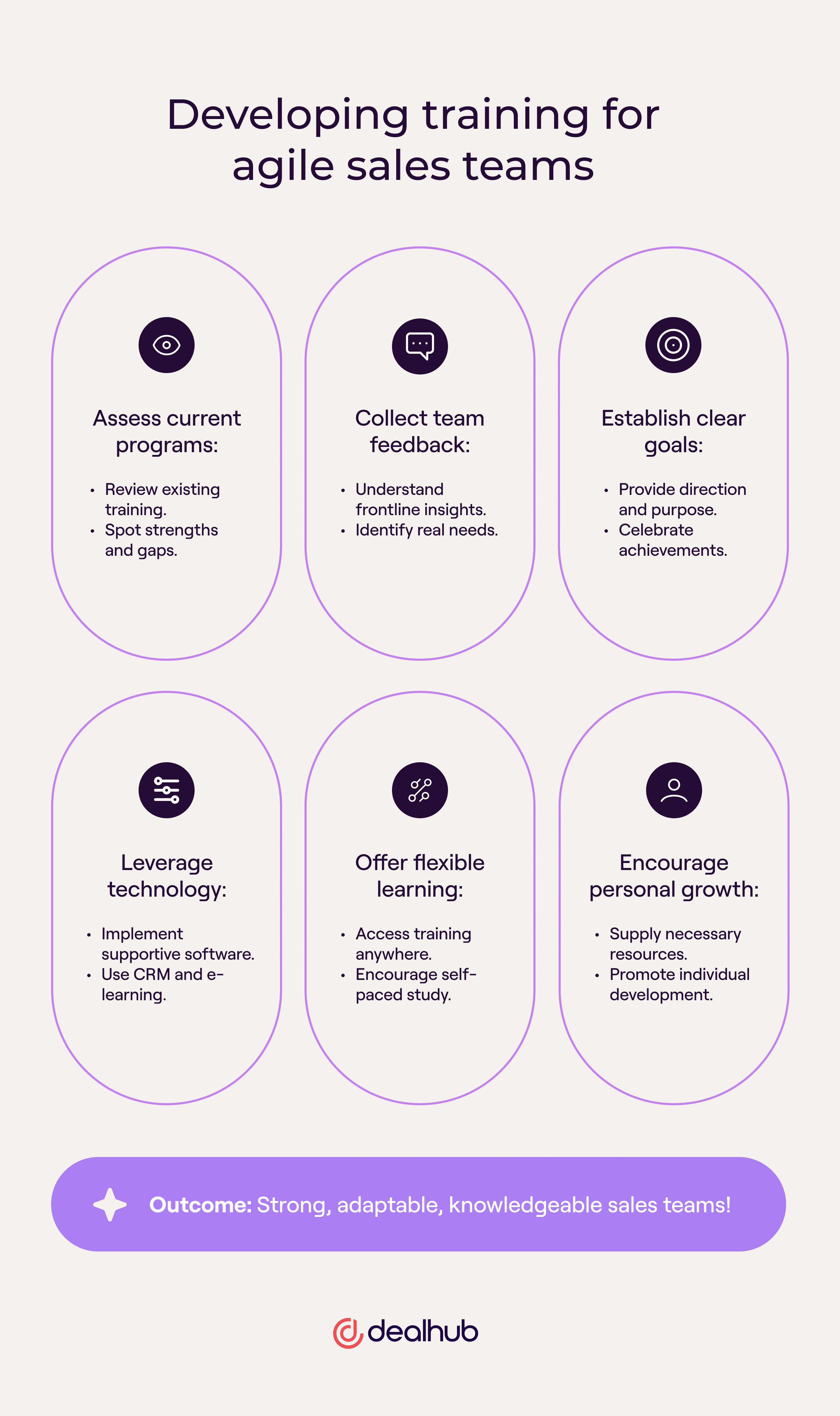Below, we look deep into the challenges and solutions related to sales training and development. From the intricacies of imparting product knowledge and honing advanced sales techniques to staying updated with real-time market insights, we’ll cover it all.
Of course, the complexities multiply for businesses operating in a remote or hybrid setting. Geography shouldn’t be a barrier to knowledge; therefore, we’ll explore innovative strategies and tools that make remote training not just possible but highly effective. Learn how to harness technology to create and retain an interconnected sales team, irrespective of location.
Join us as we unpack the essentials of creating a robust, knowledgeable, and dynamic sales team prepared for today and future-ready for tomorrow. Whether you’re a sales leader, a training professional, or a sales representative eager to learn, consider this blog your comprehensive guide to sales excellence in the digital age.
Understanding dynamic sales teams

Dynamic sales teams are quick to respond to changes, resilient in the face of adversity, and thrive on innovation. These teams don’t see change as a threat but as an opportunity to adapt and excel.
One of the critical characteristics of a dynamic sales team is its ability to foster collaboration. To succeed, they must become a cohesive unit sharing knowledge, insights, and best practices. Technology is integral for ensuring individual sales representatives work together seamlessly.
The digital revolution has transformed how we do business. Traditional sales approaches have been replaced by e-commerce, social selling, and AI-driven insights. Digital transformation has blurred the lines between online and offline sales, making it crucial for sales teams to embrace new technologies. The good news is that integrating digital tools, analytics, and automation has given modern sales professionals a new set of superpowers. They can harness data to better understand customers, predict trends, and personalize their approach. However, teams cannot wield these superpowers without continuous learning and development.
Think of it this way: if your team were an athlete, they would need to constantly train to stay in peak condition. Sales teams should be no different. The ability to adapt, learn, and evolve ensures teams continuously refine their craft, and this agility is precisely what separates the successful from the stagnant!
Developing a comprehensive training strategy for agile sales teams
Before designing your training and development approach, it’s essential to understand your starting point. What training programs are currently in place? What’s working well, and where are the gaps? Conduct a thorough assessment of your existing training initiatives.

An effective way to do this is by seeking feedback from your sales team. They are on the front lines and can provide valuable insights into what’s working and what’s holding them back.
Clear goals and objectives provide direction, purpose, and motivation. Your sales force needs to know where they’re headed and why getting there is crucial. Goal-setting also nurtures a sense of accomplishment. When your team achieves milestones, it boosts morale and fosters a culture of success.
Once you’ve built a roadmap, technology becomes your greatest ally in the training and development of your sales force. It can facilitate learning, automate processes, and provide valuable insights.
Consider implementing:
- training management software
- customer relationship management systems
- e-learning platforms
to streamline your training efforts.
With the magic of technology, sales professionals can now access training materials and resources from anywhere, allowing them to learn at their own pace – a critical aspect of adult learning. The secret to building strong, knowledgeable sales teams is to provide the resources they need to succeed and to give the space and motivation required to foster individually guided personal growth.
Leveraging technology for sales training
E-learning has revolutionized the training landscape. It’s flexible, cost-effective, and accessible from anywhere. It also can drive revenue. According to G2, 42% of American firms note an income increase after adopting e-learning.
At their convenience, sales teams can tap into a wealth of resources, from webinars and online courses to interactive modules. This promotes self-directed learning, a crucial element of continuous improvement. Virtual training takes e-learning to the next level with real-time interaction, simulation, and the opportunity for hands-on practice. It’s like a virtual playground where your sales team can refine their skills without fearing making mistakes in front of a customer.
The market is flooded with various training technologies, and choosing what’s right for your sales team can feel overwhelming. Start by identifying your training needs and goals. Do you want to enhance product knowledge, improve negotiation skills, or focus on customer relationship management?
Consider tools that align with your objectives. Tools like:
- video conferencing software
- learning management systems
- virtual reality platforms
can play a pivotal role in your training strategy.
To ensure a seamless transition to digital training, it’s essential to have a well-thought-out implementation plan. This should include onboarding sessions, user training, and ongoing support. Your team should feel comfortable with the technology and understand how it can benefit them. Encourage feedback and regular evaluations to refine your digital training strategy continually. And remember: as technology evolves, your training program should evolve with it.
Empowering remote sales teams
Companies are embracing flexibility, with 33% of sales professionals working remotely and another 26% participating in a hybrid work environment. However, proximity to the office should not create disparities in training access. Whether your sales team is in the same place or scattered across the globe, everyone should have equal access to training resources. Technology levels the playing field by providing consistent access to training materials and sessions.
Remember that consistency in brand messaging is vital for building trust and credibility with customers. Remote sales teams should understand the brand’s values, messaging, and customer personas. Ensure that your training includes product knowledge and the brand’s ethos and how to convey both effectively.
Technology promotes sales efficiency when utilized correctly. Make sure your team is proficient in the tools at their disposal. From video conferencing platforms to CRM systems, training should encompass all the technology your team relies on to excel.
Remote work can sometimes lead to isolation, but your sales team should remain connected. Encourage regular communication and collaboration through virtual meetings, team-building activities, and social events. A connected team is a motivated team!
Building a culture of continuous learning
A growth mindset is the belief that skill sets and knowledge can be developed through dedication and hard work. Encourage your sales team to embrace challenges, persist through setbacks, and view failures as opportunities to learn and grow.
While formal training is valuable, self-directed learning empowers sales representatives to take control of their own professional development. Encourage and reward team members who seek resources, books, podcasts, and online courses that align with their goals and interests.
It’s essential to provide time and resources for employees to pursue their passions. These interests can often translate into innovative sales growth approaches.
Recognition can be a powerful motivator. Acknowledge and celebrate the achievements of your sales team. Whether mastering a new skill, blowing past sales targets, or completing a training program, recognition fosters a culture of excellence. This recognition doesn’t always have to be formal; sometimes, a simple ‘thank you’ or ‘well done’ can go a long way in boosting morale and reinforcing the importance of learning.
Overcoming common sales training challenges
Change is never easy; the digital age has ushered in rapid transformations. Some team members might resist these changes, fearing the unfamiliar or worrying that shifting their approach may lead to worse results. To overcome this resistance, communicate the benefits of digital training, provide adequate support, and showcase success stories.
While the digital world is a treasure trove of information, it’s also a minefield of distractions. Sales professionals may need assistance with sifting through the deluge of data. Create a process to ensure your team develops strong information management skills that focus on quality over quantity.
Customers are more informed and discerning than ever before. Sales teams must adapt to this shifting landscape by continuously updating their understanding of customer needs and expectations. As a part of ongoing training, it’s integral that you constantly listen to clients. Conduct regular customer feedback sessions and adjust your training accordingly!
Future-proofing your sales force
The pace of technological advancement is relentless. Your sales team must be prepared for ongoing tech innovations to stay competitive. Invest in training focusing on emerging technologies like AI, data analytics, and automation. Equip your team with the skills to leverage these technologies effectively.
Getting a leg up on the competition requires constant innovation. Encourage your team to experiment with new sales strategies, adopt a customer-centric approach, and stay attuned to market trends. Listening to and learning from competitors and industry leaders can also provide valuable insights.
Keep in mind that long-term sustainability is the ultimate goal. As a sales leader, it’s your job to develop a future-proof roadmap that includes:
- ongoing training
- performance evaluations
- access to tools, branding guidelines, and knowledge bases
- regular updates to your training strategy
The aim is to foster a culture of adaptability, where your sales force is always ready to pivot and thrive.
Leading your team to success
To pave the way for ongoing success, sales leaders must set the stage for their sales representatives and encourage the pursuit of knowledge and learning for continued success. If your goal is to promote ongoing learning, integrate various elements into your training, including innovative technological platforms and flexible training strategies. Whatever you develop, remember that it has to work for diverse sales teams – no matter their location – and be flexible enough to change as the sales landscape evolves.
Practice sales enablement and consider training an ongoing opportunity as you make room for approaches that elevate your sales force. Embrace change, nurture learning, leverage technology, and lead your team to the forefront of the ever-evolving sales landscape. With the proper training and development, you’ll navigate the challenges and reach new levels of achievement – again and again.





